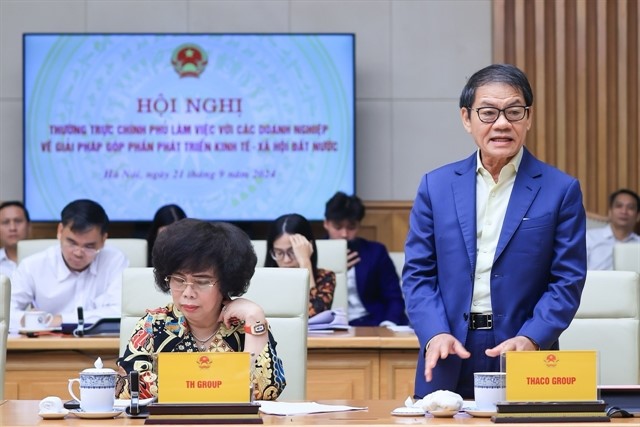THACO has outlined its strategies to enhance the Vietnamese automotive industry by fostering the development of green energy vehicles, thereby aligning with global market demands.

THACO has outlined its strategies to enhance the Vietnamese automotive industry by fostering the development of green energy vehicles, thereby aligning with global market demands.
Speaking at a recent meeting with Government officials, Trần Bá Dương, chairman of THACO, emphasised the industry’s shift towards clean energy vehicles, in accordance with Việt Nam’s commitments made during the COP26 conference.
THACO aspires to establish a vehicle manufacturing hub within Việt Nam, concentrating on exports to Southeast Asia, while enhancing local supporting industries to mitigate production costs, he said.
While vehicle sales reached a peak of 500,000 units in 2022, projections indicate a decline to 300,000 units in 2023, which may adversely impact revenue and investment plans.
THACO currently operates seven manufacturing facilities and plans to construct three additional ones, with the goal of increasing the localisation rate of passenger vehicles to 45 per cent.
As the industry transitions towards green vehicles, Dương underscored the importance of a well-defined roadmap and the necessity for investment in infrastructure.
“Currently, most automotive manufacturers working with THACO focus on electric vehicle development, but sales in Việt Nam are limited to pilot projects aimed at reducing consumer risks,” he said.
Hybrid vehicles, capable of operating 80-150 kilometres solely on battery power, are being promoted in conjunction with the implementation of Euro 5 emission standards, according to Dương.
THACO’s comprehensive strategy, initiated in 2014, fosters the development of green energy, including the establishment of zero tax rates and free trade agreements, while addressing vehicle emissions.
The long-term vision for the automotive sector extends to 2030 and 2050, aiming for advancements in gearbox engines that align with green energy initiatives.
Manufacturers in the supporting industry are encouraged to invest in technology and ensure sufficient demand for their products.
Investment in supporting industries requires substantial production capacity and advanced technology.
THACO has been proactive in mechanical production, achieving nearly US$140 million in exports in 2024 through sales to foreign direct investment (FDI) enterprises, which generated an additional $20 million in exports.
“We face challenges related to trade defense, particularly concerning raw materials and components sourced from China,” he said.
THACO plans to double its production capacity next year and is in the process of developing an industrial park for mechanical production in the southern region.
Currently, FDI companies assemble their products domestically, and THACO aims to manufacture 35-40 per cent of the required components.
THACO this year sold automotive parts to domestic manufacturers, including Hyundai, Ford, Toyota, and Isuzu, generating $13 million in revenue, with expectations for growth in the following year.
“We advocate for the establishment of a clear strategic framework for the supporting industry,” he added.
While discussions surrounding semiconductors and emerging technologies are prevalent, engagement in the global value chain requires time, he said.
The mechanical sector is becoming increasingly integral to Việt Nam’s industrial landscape, providing opportunities for unskilled labour, he added.
“We urge the government to recognise this as a significant opportunity for the development of foundational industries and the enhancement of export capabilities.” — VNS






